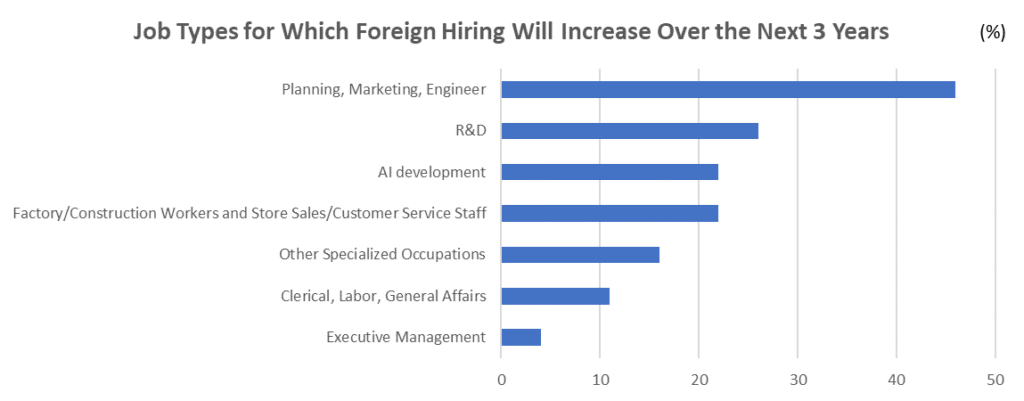Japan’s leading companies are positioning foreign workers as essential personnel for business operations. In the Nikkei “Survey of 100 CEOs,” over 90% of respondents expressed support for the government’s current policy to expand foreign worker intake. The push is not only a response to labor shortages but also an urgent effort to secure highly skilled talent amid rapid technological innovation.
Companies aim to ensure diversity while responding to a shrinking labor pool.
The survey was conducted between September 3 and 22, 2025, targeting presidents and chairpersons of major Japanese companies. A total of 141 firms responded.
As of the end of 2024, the number of foreign residents in Japan reached approximately 3.77 million—an increase of one million over the past three years—now accounting for 3% of the total population. The Japanese government has adopted a proactive policy to accept foreign workers with specialized skills, anticipating further growth in the foreign resident population.
Regarding the government’s policy to expand foreign worker intake, 34.8% of respondents said they “support” it, while 63.0% said they “somewhat support” it—bringing total approval to 97.8%.

In a recent survey conducted by Nikkei between September 3 and 22, 2025, over 90% of CEOs and chairpersons from major Japanese companies expressed support for the government’s policy to expand foreign worker intake. This marks a significant shift in how foreign talent is being positioned—not just as a solution to labor shortages, but as a strategic asset for innovation and growth.
When asked about their hiring policies for the next three years, 99.2% of companies said they plan to hire foreign workers either proactively or as needed. Interestingly, the top reason cited was “securing diversity” (38.2%), which surpassed “addressing labor shortages” (19.0%). Diversity is increasingly seen as a catalyst for innovation, enabling teams with varied perspectives and experiences to generate new ideas and drive technological advancement.
The job categories expected to see increased foreign hiring include:
- Planning, Marketing, and Engineering (45.7%)
- Research and Development (26.0%)
- AI Development (22.8%)
- Factory and Construction Workers, and Store Sales Staff (22.8%)
These results highlight a strong demand for highly skilled professionals, especially in areas tied to Japan’s future competitiveness.
Executives from leading companies emphasized the importance of foreign talent:
- Isao Teshirogi, President of Shionogi & Co., stated that accepting highly skilled foreign professionals is essential for Japan’s economic growth.
- A precision machinery manufacturer noted the shrinking domestic pool of engineers and technicians, calling for more flexible hiring of foreign workers.
- Sadanobu Takemasu, President of Lawson, stressed that foreign staff are not just filling labor gaps—they’re bringing new value to companies and society.
Despite strong support, companies also pointed out key challenges:
- Insufficient Japanese language skills (49.6%)
- Complex visa and residency management (27.0%)
- Differences in compensation systems (16.3%)
In response to social concerns, 65.0% of executives said there should be a cap on foreign worker numbers. Among them, 71.1% suggested keeping the foreign population below 5–10% of Japan’s total.
Corporate leaders also emphasized the need for social infrastructure to support coexistence:
- Shigeo Nakamura, President of Ajinomoto, called for improvements in education, social support, and legal systems to ensure harmony and protect local employment.
- Hiroyuki Isono, President of Oji Holdings, expressed hope for policies that foster a multicultural society where both Japanese and foreign residents can live with peace of mind.
Source: Nikkei. (2025, September 30). Over 90% of Business Leaders Support Expanding Foreign Worker Intake — Especially for Highly Skilled Professionals
https://www.nikkei.com/article/DGXZQOUC242920U5A920C2000000
Afterword
Looking ahead, Japanese companies are expected to further strengthen their efforts to welcome foreign talent as a vital part of their workforce. Among them, international students who graduate from Japanese universities are especially attractive candidates. Having already adapted to life in Japan and developed a cultural understanding, these individuals are well-positioned to contribute meaningfully to Japanese organizations. And those who speak both English and Japanese hold even greater market value.
While Japanese language skills may not be required at the time of university admission, students who actively improve their Japanese during their studies will significantly expand their career opportunities in Japan.
If you’re considering working in Japan after graduation, it’s wise to factor in the university’s location when choosing where to study. There are many excellent universities outside of Tokyo as well. If you’re unsure which university is the right fit for you, feel free to reach out—we’re here to help.

